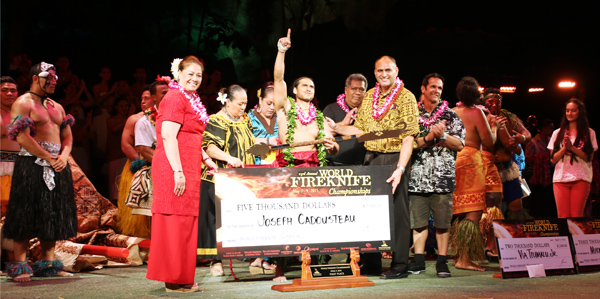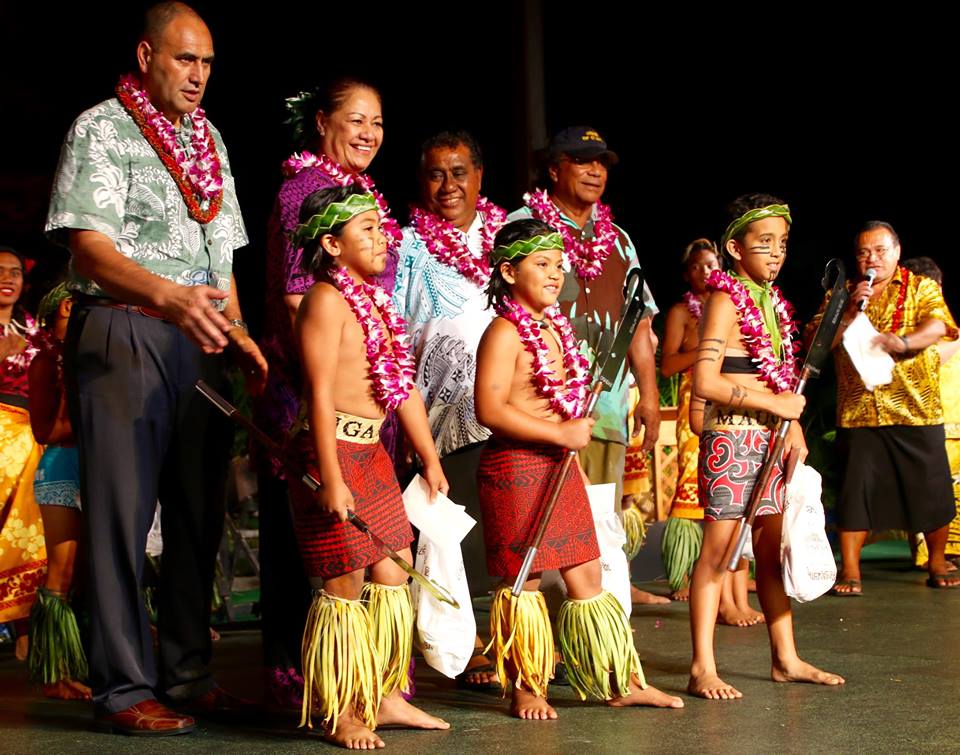For the past 23 years the Polynesian Cultural Center has brought together many of the finest, most exciting Samoan knife dancers in the world — and please note, not all of them are ethnic Samoans — to compete for the title of World Fire Knife Champion.

Over approximately the past 10 years, three of those young men have repeatedly reached the finals, including this year on May 9 during the middle of the PCC’s world-famous evening show, Hā: Breath of Life:
- Joseph Cadousteau of Papeete, Tahiti, 2015 champion: Cadoustaeu, who performs regularly at Disneyland Hong Kong, has placed in the top-three every year he’s entered, and he previously won in 2012 and 2013. Contest rules require a back-to-back champion to sit out one year. He received a $5,000 cash prize and a ceremonial knife trophy.
- Mikaele Oloa of Waialua, Oahu, 2015 first runner-up: Oloa, who works for Tihati Productions in Hawaii, previously took first place in 2005, 2006, 2009 and 2010. He received a $3,000 cash prize and a ceremonial knife trophy.
- Viavia “VJ” Tiumalu Jr. of Orlando, Florida, 2015 second runner-up: Tiumalu, who performs at Disnley World’s “Lion King” show in Orlando, Florida, was previously champion in 2008, 2011 and 2014. He received a $2,000 cash prize and a ceremonial knife trophy.
They began the competition, along with 16 others in the open division — ages 18 and up, or younger in the World Fire Knife Championship preliminary round in the PCC’s Hale Aloha on Thursday, May 7. The younger competitors who enter the 18+ division cannot drop back down once they enter this division. At the end of that evening, the plan was for six of them to continue as semi-finalists, but as PCC Director of Cultural Islands and emcee Delsa Atoa Moe explained, two of them tied, so the field of semi-finalists expanded to seven. The other semifinalists were (in no particular order):
Kuinise Leiataua of Honolulu; Andrew Umi Sexton III of Waianae, Oahu; Viceson Galea’i of Laie, Oahu; and Vaia’oga Matuni of Orlando, Florida. Each of them received a $500 cash prize.
The competition that first night was fierce, and undoubtedly the difference came down to who, or how many times, a warrior dropped a knife.
They ran off against each other on the second night, May 10, with the three finalists named that night. “I’m very happy that I’m with VJ and Mika once more in the finals. This trio is a very good one,” Cadousteau said that evening.
At the beginning of that evening, the junior division, ages 6-11, started the competition. They showed some tremendous talent: The future of fire knife dancing is in good hands; but in the end, the winners were:

- Matagi Lilo of Kapolei, Oahu, first place
- Isaako Milford of Punaluu, Oahu, and Orlando, Florida, second place
- Mose Lilo of Ewa Beach, Oahu, third place
The intermediate division competition, ages 12-17, took place right after among 14 entrants. Again, many of these young men and women — that’s right, there are female fire knife dancers — are fearless and shared great routines with the judges and crowds…
…and the winners were:
- Hale Motu’apuaka of Aiea, Oahu, first place. Amazingly, Motu’apuaka, now 15, has participated in every PCC World Fire Knife Championship since he was three years old — although for the first three years in exhibition only, and he’s going to be an awesome open division competitor when he inevitably makes the move. For example, both Oloa and Tiumalu moved up to the open division as 16-year-old intermediates, and their gambles paid off.
- Miss Jeralee Galea’i of Laie, second place.
- Achilles Tafiti, also of Laie, third place.
“The level of competition was so amazing,” said Delsa Moe, PCC Director of Cultural Productions. “The senior competitors are so smooth, graceful and competitive in their performances. It’s wonderful to watch their variety of styles on the stage; and I’m also impressed with the level of creativity some of the younger competitors have shown.
 Mike Foley, who has worked off-and-on
Mike Foley, who has worked off-and-on
at the Polynesian Cultural Center since
1968, has been a full-time freelance
writer and digital media specialist since
2002, and had a long career in marketing
communications and PR before that. He
learned to speak fluent Samoan as a
Mormon missionary before moving to Laie
in 1967 — still does, and he has traveled
extensively over the years throughout
Polynesia and other Pacific islands. Foley
is mostly retired now, but continues to
contribute to various PCC and other media.

Recent Comments